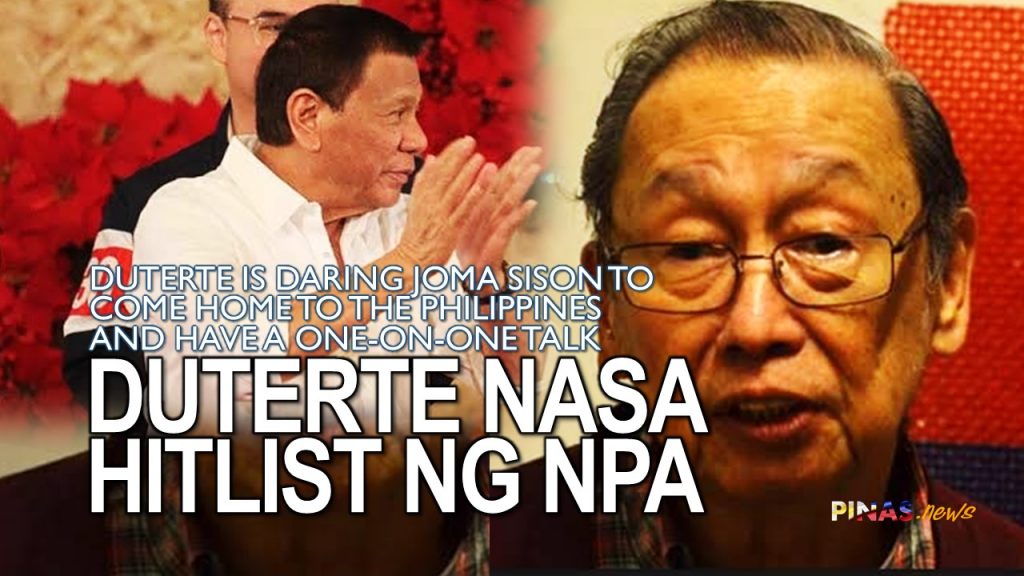Implications and possible consequences of resuming GRP-NDFP peace negotiations
By Jose Maria Sison
NDFP Chief Political Consultant
December 14, 2019
On the basis of my conversations with Secretary Bello last December 7 and 8 in Utrecht, there is definitely a desire of the principals of the GRP and NDFP to resume the peace negotiations previously terminated by the Duterte regime and further encumbered by repressive measures, like Proclamation Nos. 360 and 374, Memorandum Order No. 32 and Executive Order No. 70.
Informal meetings can resolve issues and prepare the formal meeting to resume the peace negotiations by reaffirming bilateral agreements since The Hague Joint Declaration of 1992 and overcoming obstacles as well as the subsequent formal meeting to finalize the Interim Peace Agreement, which is a package of general amnesty for political prisoners, major articles of CASER on agrarian reform and national industrialization and bilateral ceasefire.
But there are many people who fear that in agreeing to resume the peace negotiations the NDFP might be compromised and set up by the Duterte regime for an inevitable termination of the peace negotiations and use the breakdown of peace negotiations as pretext for the further escalation of tyranny and repression and as the cover for railroading charter change that institutionalizes fascism and surrenders the national patrimony and sovereign rights to imperialist powers and foreign monopoly banks and firms.
Of course, there are big risks taken by the NDFP in agreeing to negotiate peace with the GRP and address the roots of the armed conflict by agreeing on social, economic and political reforms. The many people who are worried about the risks and who advice prudence to the NDFP are justified because of previous bad experience and the continuing pro-imperialist and reactionary interests dominating the GRP and the Duterte regime.
In line with the national and democratic rights and interests of the Filipino people, the NDFP is determined to be alert to the risks and to be prudent in the peace negotiations. It holds firmly revolutionary principles and at the same time it has the flexibility in policy to try persuading the GRP to come to comprehensive agreements on social, economic and political reforms within the framework of national independence, democracy and social justice.
So long as there is yet no final peace agreement, the Filipino people and the revolutionary forces have all the right to wage all forms of revolutionary struggle against oppression and exploitation. The NDFP negotiating panel can withdraw from the peace negotiations if and when these are being used by the GRP merely to compromise and set up the NDFP and the revolutionary movement for the escalation of tyranny and repression and for charter change that violates the national patrimony and sovereign rights of the Filipino people.
While there is still adequate reason for carrying out peace negotiation, both the GRP and NDFP should strive to use these in undertaking goodwill and confidence building measures and making comprehensive agreements on social, economic and political reforms for the benefit of the people. The CARHRIHL can be a guide for getting rid of tyranny and repression. As soon as possible, the CASER should be completed, finalized, mutually approved and implemented immediately. The GRP and NDFP reciprocal working committees should scontinue drafting the CAPCR even now.
There will be a great leap of trust and confidence when the CASER is mutually approved and is implemented immediately. The Red fighters of the NPA and the soldiers of AFP who come mainly from the toiling masses of workers and peasants will be happy to see that their families will benefit from genuine land reform, rapid employment through national industrialization, higher incomes and expanded social services (education, health, relief and rehabilitation, etc.). Even the private entrepreneurs will be happy with the greatly expanded opportunities opened up by land reform and national industrialization.###

Paki-SHARE po para KUMALAT! Maraming salamat po, kabayan.

Ano sa palagay mo?